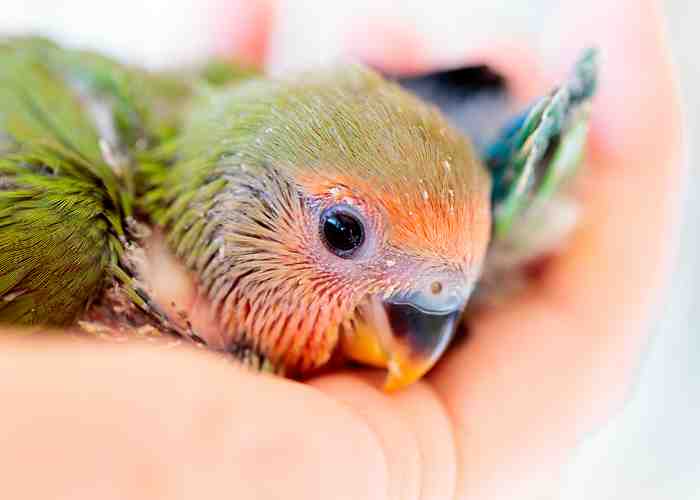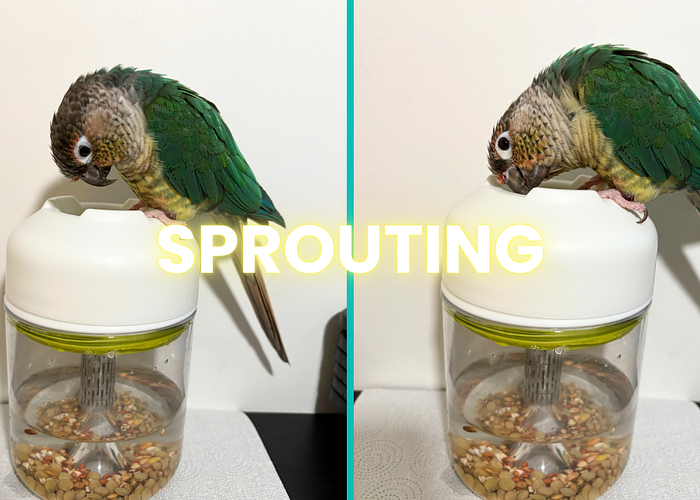Is Saliva Dangerous For Parrots?
In short, yes, it can be, and you want to avoid having your parrot interact with any saliva, whether it's from you or any mammal. One thing that many people don't realize is that human saliva can be toxic to birds.
When a bird comes into contact with mammal saliva, it can cause them to become ill or worse. This is because mammal saliva contains a bacteria called Streptococcus mutans. This bacteria is harmless to humans, but our birds cannot battle it. Additionally, if we have cuts or sores in our mouths, these can also transmit diseases to birds.
Now, we have a unique situation with Lambo, our toy poodle; he truly is an angel and is very well-trained. Still, we have also learned that as cute as it could be for him to "kiss" the birds, we don't allow it.
The same goes for us! I love kissing my birds (head and neck area), but I do not allow them to have any contact with the inside of my mouth. You also want to ensure you never let your bird eat out of your mouth; it's okay to share food with your bird, but make sure they have their own or if you're sharing something, ensure it doesn't have your saliva covering it.
And dog saliva can also transfer bacteria to humans! For example, certain intestinal parasites can be carried in dog saliva, and though it's rare, they can be transmitted to humans. In addition, dogs are known to lick their behinds after defecation and greet each other with a nose-to-butt greeting. This means microscopic bacteria and parasites carried in fecal material can be present in dogs' mouths and nasal cavities.
When a bird comes into contact with mammal saliva, it can cause them to become ill or worse. This is because mammal saliva contains a bacteria called Streptococcus mutans. This bacteria is harmless to humans, but our birds cannot battle it. Additionally, if we have cuts or sores in our mouths, these can also transmit diseases to birds.
Now, we have a unique situation with Lambo, our toy poodle; he truly is an angel and is very well-trained. Still, we have also learned that as cute as it could be for him to "kiss" the birds, we don't allow it.
The same goes for us! I love kissing my birds (head and neck area), but I do not allow them to have any contact with the inside of my mouth. You also want to ensure you never let your bird eat out of your mouth; it's okay to share food with your bird, but make sure they have their own or if you're sharing something, ensure it doesn't have your saliva covering it.
And dog saliva can also transfer bacteria to humans! For example, certain intestinal parasites can be carried in dog saliva, and though it's rare, they can be transmitted to humans. In addition, dogs are known to lick their behinds after defecation and greet each other with a nose-to-butt greeting. This means microscopic bacteria and parasites carried in fecal material can be present in dogs' mouths and nasal cavities.
PS.
Having dogs and birds interact is something that requires a lot of caution. I have often shared on YouTube, Instagram and our blog how we introduced our birds to Lambo and how they developed a bond and kind friendship. Please be mindful that this will differ for every dog, bird interaction, or household. A dog is a predator, and a bird is a prey, so you must exercise extreme caution because there are too many stories of parrots getting hurt or worse in a household with interspecies interactions. But you want to ensure that birds are never interacting with your dog's mouth; not only is the saliva dangerous, but that's where those razor-sharp teeth are as well!
Parrots are different from mammals physiologically, so we should keep their environment separate. One thing we also know, according to research, is that bird saliva contains enzymes that can break down toxins. This means that if human saliva did contain toxins, they would likely be broken down by the bird's saliva before they could do any harm. Birds have a different digestive system than humans, so what may be toxic to us might not be harmful to them and vice versa.
Another thing to note is that according to research, the most common diseases that humans have, including the flu and the common cold, cannot be passed from a human to a parrot. However, if a human has a bacterial infection or has been a carrier of a bacterial infection, your bird could potentially catch it.
One disease that can be passed from your pet bird to you is called Psittacosis. This is an infectious disease that is spread from birds to humans. It is a bacterium called Chlamydia psittaci, and this is the bacteria that causes the disease.
There are ways that you can make sure that your pet parrot stays safe, and this is by making sure that you and your family members are practicing good hygiene, avoiding sharing saliva with your bird and always washing your hands before and after handling your bird.
Parrots are different from mammals physiologically, so we should keep their environment separate. One thing we also know, according to research, is that bird saliva contains enzymes that can break down toxins. This means that if human saliva did contain toxins, they would likely be broken down by the bird's saliva before they could do any harm. Birds have a different digestive system than humans, so what may be toxic to us might not be harmful to them and vice versa.
Another thing to note is that according to research, the most common diseases that humans have, including the flu and the common cold, cannot be passed from a human to a parrot. However, if a human has a bacterial infection or has been a carrier of a bacterial infection, your bird could potentially catch it.
One disease that can be passed from your pet bird to you is called Psittacosis. This is an infectious disease that is spread from birds to humans. It is a bacterium called Chlamydia psittaci, and this is the bacteria that causes the disease.
There are ways that you can make sure that your pet parrot stays safe, and this is by making sure that you and your family members are practicing good hygiene, avoiding sharing saliva with your bird and always washing your hands before and after handling your bird.


.png)

